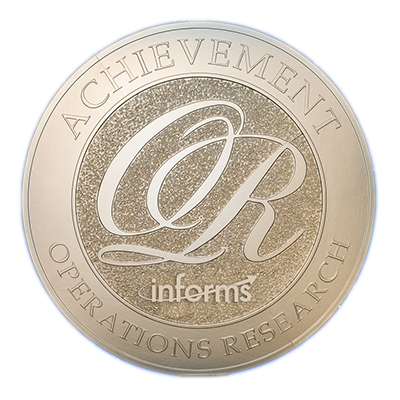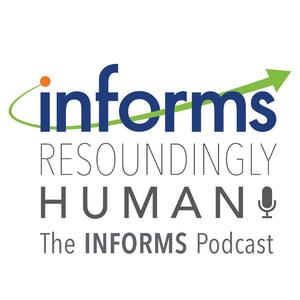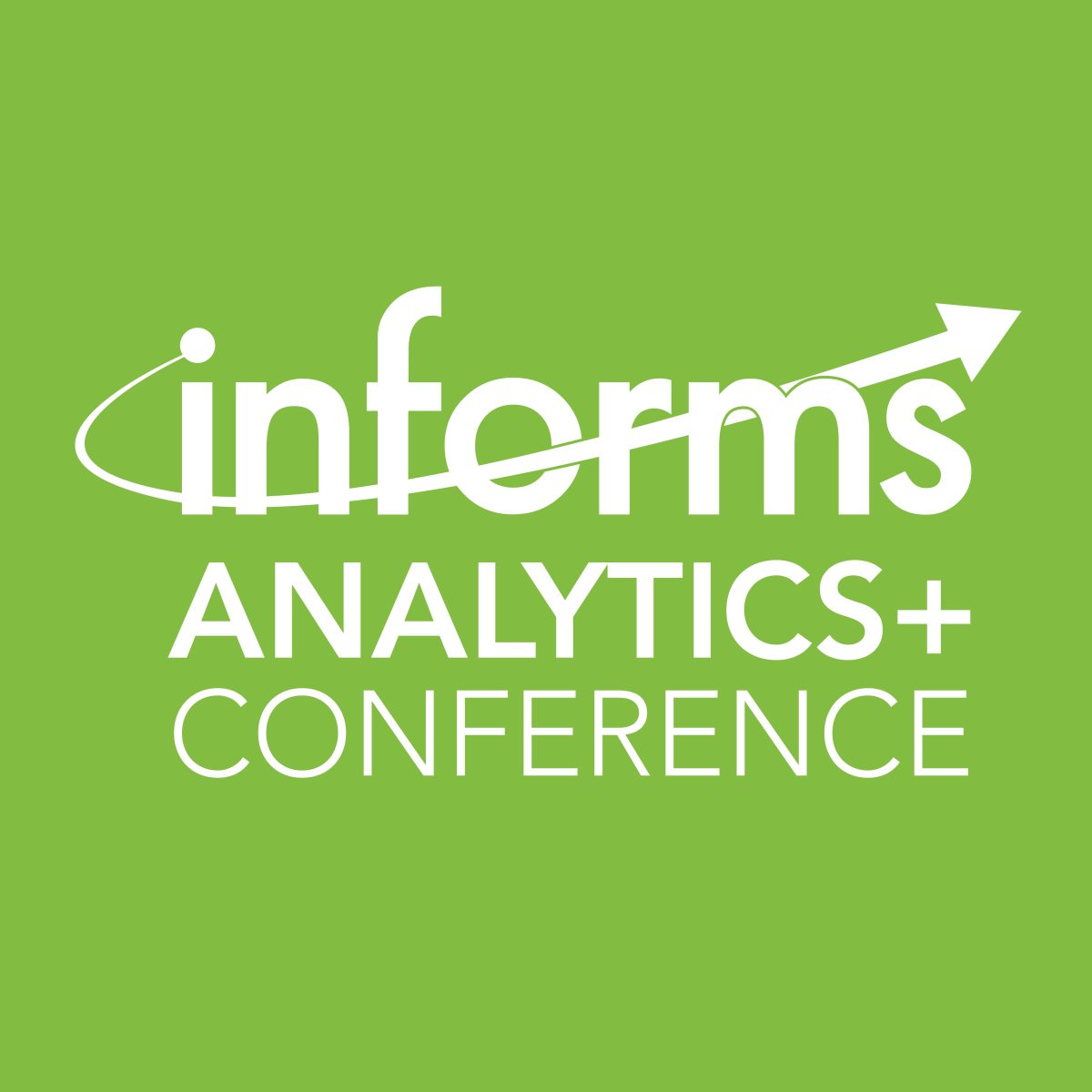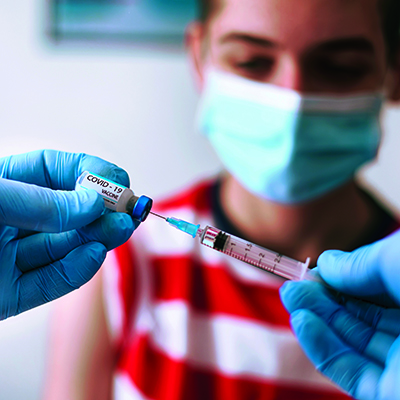Published: March 22, 2025

Welcome to the latest in our special series of Resoundingly Human podcasts highlighting the finalist teams for the 2025 Franz Edelman Award, the Nobel Prize of Analytics, which will be awarded at the upcoming 2025 INFORMS Analytics+ Conference in Indianapolis this April.
These finalist projects represent teams from around the world who have leveraged advanced analytics to transform their organizations, address their most significant challenges, and better serve their customers and communities. Today I’m joined by members of the team representing Lufthansa to discuss their finalist project in the lead-up to the Franz Edelman competition.
One of the subject matter experts, one of the operations controllers, had written a tiny example that was, I think four aircraft and about six flights. They’d assigned the aircraft to those flights and computed what the costs should be and we were just making sure we got the same numbers out, making sure we were accounting for things the same way, that we’d implemented the maths the way they were expecting. We turned this into the format we needed for the solver, we ran it through, and we got a different result. We were searching for a bug for I think the best part of a day before we realized that actually the solver had found a correct but better solution. So even with just six flights this is a hard enough problem that humans struggle to compete with operations research techniques.
Interviewed this episode:

Christian Most
Luftansa
After running two top management offices at Lufthansa, Christian is now responsible for digital optimization in operations and leading the joint development for decision support tools for operations control with Google Cloud.

Toby Davies
Toby is an experienced Software Engineer with over 10 years’ experience building decision support tools, using Operations Research and Artificial Intelligence. In addition to this practical experience, Toby has a strong theoretical background as an award-winning researcher with a Ph.D. investigating applications of Operations Research techniques to Artificial Intelligence Planning problems.
Related Episodes
Episode Transcript
Ashley K:
Welcome to the latest in our special series of resounding the Human podcast, highlighting the finalist teams for the 2025 Franz Aleman Award, the Nobel Prize of Analytics, which will be awarded at the upcoming 2025 and Forms Analytics plus conference in Indianapolis this April. These finalist projects represent teams from around the world who have leveraged advanced analytics to transform their organizations, address their most significant challenges and better serve their customers and communities. Today I’m joined by members of the team representing Lufthansa to discuss their finalist project in the lead up to the Franz Aleman competition. Could you briefly introduce yourselves and the finalist project you’re being recognized for in this year’s Franzs Limit Award competition?
Christian Most:
Yes, of course. Hi Ashley. I’m Christian from the Lufthansa Group. I’m leading our project dealing around with decision support for airline schedule recovery. That’s a project we call obsd for ops decision support, which was dated back to an idea back in 2018. We got stopped by Covid in the middle and restarted in 2021, and we are developing decision support tools for our operations control centers for all group airlines.
Toby Davies:
Hi, I’m Toby. I’m a staff software engineer on the operations research team at Google. We’ve been partnering with Lufthansa Group and Swiss Airlines in particular to start off with, and this is actually the first time that the applied operations research team within Google has worked with an external customer and I joined this team right at the start as a result of this collaboration.
Ashley K:
So I’d love to know, did you use analytics in a unique or unexpected way to approach this challenge?
Christian Most:
Yeah, for sure. There are some aspects that are quite new, maybe in the way for analytics, but definitely in the way how airlines deal with disruption management. So for operation steering, it’s more or less the first time that we tried to solve this challenges in decision-making, whether you are delaying a flight or flight, which flight do you have to cancel in case of an irregularity? We try to approach this holistically, so not in a sequential way of decision making, but really integrating different aspects of the decision into one decision point, data driven and also made in a very new way from an organizational perspective by one decision maker rather than to divide the problem into subdivisions and a lot of people talking to each other to evaluate different scenarios. The second thing that we are trying to achieve with this new way of approaching the challenge is that we are developing our tools and the optimization with a real time capability.
So we are not only can pre-plan certain scenarios ahead in case of a weather event or so, but really to have this opportunity for users to do optimizations in a real time environment when the actual problem occurs, which have a lot of implications on how you develop things, how you program things, and how you build things in the end. The last important point for us is really the challenge with the end user to actually make them use this tool because in the beginning it’s more or less a black box. So we were strapping it down to very simple optimizations with a lot of transparency in the data in the optimization, and then starting to build up on the first tools and made it more complex and more complex to have this user experience not only on the technology side of our development, but also on the end user side to take them with us in that journey.
Toby Davies:
To add to that sort of change management and business kind of perspective, there’s a lot of interesting technical things that we’re doing here. We managed to basically come up with a very flexible API that allows us to break down this very complicated multifaceted analytics problem into sub-problems that reflect the business, the business’s existing approach to this problem, which allows us to take advantage of subject matter experts expertise, but also techniques like portfolios and mixing local search and large neighborhood search and with complete methods as well like column generation. We’ve done a really good job with getting that API worked out so that we can do a lot of different things and we can experiment independently with each of the different components of the silver.
Ashley K:
So I’d love to have you share how did your team balance the technical complexity with ensuring the solution was practical and implementable on the ground?
Toby Davies:
That’s a really good question. In some sense we kind of got a little bit lucky with covid kind of forced us to restructure the project to get early wins and that really made us think about how to achieve this. We’d originally started off thinking that the whole thing would be a 12 month project. We’re now four and a half years in I think. So that was never going to happen. But our approach that we ended up taking as a result of this was focusing on letting people fix the problems, continue to fix problems as they have been over the course of the day, but overnight trying to reoptimize because no plan ever really survives contact with the real world. And so acknowledging that and then taking the fact that the original plan was generated weeks or months earlier, but things have changed Retiming and continuously doing that every night is enormously more simple in terms of the data requirements, but still gives us the vast majority of the possible savings and we have a bit more time to be able to generate those recommendations. And of course that API that I mentioned previously, this gives us some really nice software engineering boundaries between the components that allows people to experiment with new ideas without totally having to break everything and start from scratch and not being able to integrate their changes in with the whole overall system. But at the end of the day, a thing with an analytics problem, the real hard part is getting the data right and that was mostly on the left-hander side of things. So Christian, did you have anything to say there?
Christian Most:
Thanks Toby. We have a lot of data in our airlines because for example, our aircraft or each engine produces gigabytes of data every minute, but of course it’s the art of selecting the right data and then checking if we have it in the right quality or to improve the quality needed and then actually to provide it in a way that it’s actually calculated and offered to an optimized in a real time environment. So for us at the Luten group, because we have multiple airlines that we want to roll out this system to, we had to do a lot of work in terms of data preparation and standardization across of our airlines because they’re not somehow standardized in certain aspects when it comes to core systems, but when it comes to data warehousing or data availability, it’s a whole different thing. So we invested way more time than we thought and establishing a new real-time data platform with a new data model, actually serving the pure purpose of decision support in our project, bringing the data and the compilation of the algorithms in the end to the optimizers in our partnership with Google. So this is a total different approach than that we thought and how we approach it in the beginning. And so this level of data preparation, the building of the platform was the foundation of actually being able to develop scaling software applications for our multiple airlines in the Lufthansa group.
Ashley K:
So the results of this project have clearly made a significant impact. Could you share some of the tangible benefits or improvements Lufthansa has experienced since implementing your solution?
Christian Most:
Yeah, since we are running for four and a half years, there are a couple of things definitely to mention. So first of all, we managed to establish there was not there before the own software development capability in operations. So being able to get from the business expertise up to operating tools on a day-to-day basis. So establishing the whole organization processes and roles that you need today in agile software development was definitely one of the biggest achievements for us where we now can build up on. Moreover, definitely the economical benefits that we gained were very significant and drove the growth also of the project and the continuation of this partnership. So from the very beginning of our project in 2021, we saved about $12.5 million in variable costs already on an optimized baseline. So when the first tail optimization was already done by different other tools, we managed to find additional savings and variable cost of each information and provided that to our end users.
In this 1240 5 million, there are different cost elements, but one of the biggest ones definitely is the improved fuel cost, which then also has a positive impact on our sustainability, which is a big topic for us as an airline group. And by this we managed since the beginning to save 18,000 tons of CO2, which is an equivalent to about 80 intercontinental flights between Germany and the United States. And that’s a real improvement, which is important for us as an airline group to become CO2 neutral in the very future. And the outlook because we started at one airline of the Lufthansa group, which is Swiss International Airlines. And in the meanwhile we are scaling across other airlines like Lufthansa Airlines and Euro Wings. We see a total potential of about $30 million annually when we continue our feature development and the scaling across our group airlines in the next months and years. And the last point, which is maybe the most important one, is that we finally can make our operations easier and more enjoyable for our customers. We are now able to provide informations for passengers in a disruption earlier. We can manage disruptions in a way that less passengers are impacted and this will overall lead to a more convenient travel in our Lufthansa group airlines.
Ashley K:
Alright, before we wrap up, is there any final thought or perhaps a story you’d like to share that encapsulates the spirit of your team and your journey to the Franz Edelman Award competition?
Toby Davies:
Yeah, there was one very early story that I remember quite clearly back, I think it was probably in 2021. This was a very, very early version of that day before operations tail assignment solver. And we were just collecting some test instances to see if we could make sure that we got all the constraints right and things like this. And so one of the subject matter experts, one of the ops controllers had written a tiny example that was, I think it was four aircraft and about six flights, and they’d assigned the aircraft to those flights and computed what the costs should be. And we were just making sure that we got the same numbers out, making sure that we were accounting for things the same way that we’d implemented the maths the way that they were expecting. And we turned this into the format we needed for the solver.
We ran it through and we got a different result and we were searching for a bug for I think, best part of a day before we realized that actually the solver had found a correct but better solution. So even with just six flights, this is a hard enough problem that humans struggle to compete with operations research techniques, and that’s really why we did this. We knew this would be the case, but it’s been a really, really fun journey to make sure that the business understands as well, all the way from executives down to the people actually doing the job day-to-day. They have an easier time of optimizing things because they don’t need to try a million different combinations they can ask the computer.
Ashley K:
Thank you both so much for taking the time to share this special insight into your finalist project. I wish you the very best of luck in the Franz Delman Award competition and I look forward to meeting you and the rest of your team in person in Indianapolis for the 2025 informs Analytics plus conference.
Toby Davies:
Thank you, Ashley. See you there. Thanks, Ashley.
Ashley K:
You’d like to learn more about today’s episode and guest, visit resoundingly human.com and check out our show notes. The podcast is also available for streaming and download on Amazon Music, apple Podcasts, Google Podcasts, and Spotify. Wherever you listen, please be sure to leave a five star review to help others find and enjoy the podcast. Until next time, I’m Ashley Kay and this is resoundingly human.


